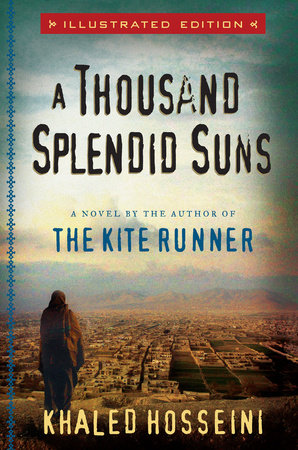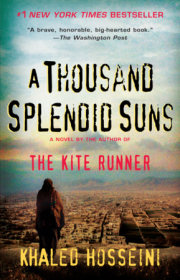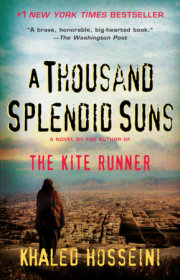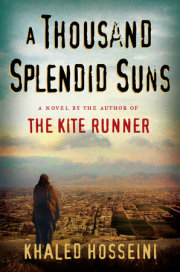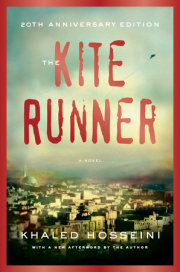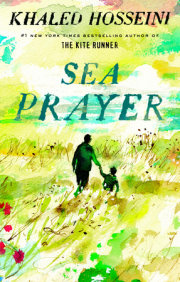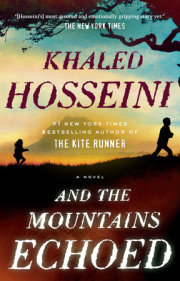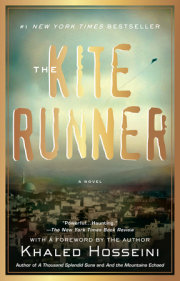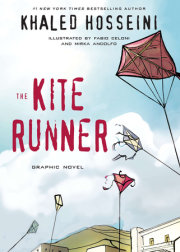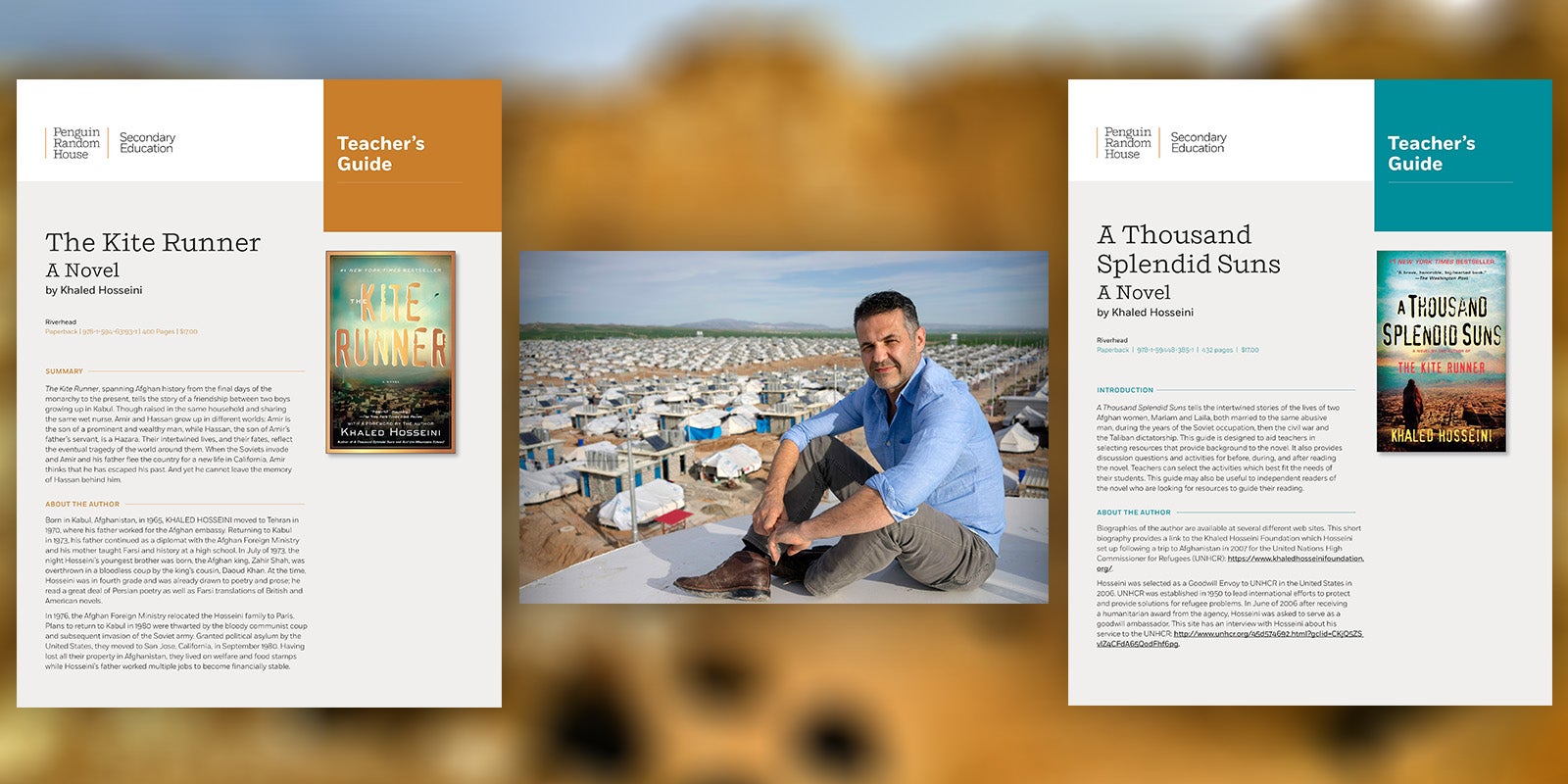PART ONE1.
Mariam was five years old the first time she heard the word harami.
It happened on a Thursday. It must have, because Mariam remembered that she had been restless and preoccupied that day, the way she was only on Thursdays, the day when Jalil visited her at the kolba. To pass the time until the moment that she would see him at last, crossing the knee-high grass in the clearing and waving, Mariam had climbed a chair and taken down her mother’s Chinese tea set. The tea set was the sole relic that Mariam’s mother, Nana, had of her own mother, who had died when Nana was two. Nana cherished each blue-and-white porcelain piece, the graceful curve of the pot’s spout, the hand-painted finches and chrysanthemums, the dragon on the sugar bowl, meant to ward off evil.
It was this last piece that slipped from Mariam’s fingers, that fell to the wooden floorboards of the kolba and shattered.
When Nana saw the bowl, her face flushed red and her upper lip shivered, and her eyes, both the lazy one and the good, settled on Mariam in a flat, unblinking way. Nana looked so mad that Mariam feared the jinn would enter her mother’s body again. But the jinn didn’t come, not that time. Instead, Nana grabbed Mariam by the wrists, pulled her close, and, through gritted teeth, said, “You are a clumsy little harami. This is my reward for everything I’ve endured. An heirloom-breaking, clumsy little harami.”
At the time, Mariam did not understand. She did not know what this word harami-bastard—meant. Nor was she old enough to appreciate the injustice, to see that it is the creators of the harami who are culpable, not the harami,whose only sin is being born. Mariam did surmise, by the way Nana said the word, that it was an ugly, loath-some thing to be a harami, like an insect, like the scurrying cockroaches Nana was always cursing and sweeping out of the kolba.
Later, when she was older, Mariam did understand. It was the way Nana uttered the word—not so much saying it as spitting it at her—that made Mariam feel the full sting of it. She understood then what Nana meant, that a harami was an unwanted thing; that she, Mariam, was an illegitimate person who would never have legitimate claim to the things other people had, things such as love, family, home, acceptance.
Jalil never called Mariam this name. Jalil said she was his little flower. He was fond of sitting her on his lap and telling her stories, like the time he told her that Herat, the city where Mariam was born, in 1959, had once been the cradle of Persian culture, the home of writers, painters, and Sufis.
“You couldn’t stretch a leg here without poking a poet in the ass,” he laughed.
Jalil told her the story of Queen Gauhar Shad, who had raised the famous minarets as her loving ode to Herat back in the fifteenth century. He described to her the green wheat fields of Herat, the orchards, the vines pregnant with plump grapes, the city’s crowded, vaulted bazaars.
“There is a pistachio tree,” Jalil said one day, “and beneath it, Mariam jo, is buried none other than the great poet Jami.” He leaned in and whispered, “Jami lived over five hundred years ago. He did. I took you there once, to the tree. You were little. You wouldn’t remember.”
It was true. Mariam didn’t remember. And though she would live the first fifteen years of her life within walking distance of Herat, Mariam would never see this storied tree. She would never see the famous minarets up close, and she would never pick fruit from Herat’s orchards or stroll in its fields of wheat. But whenever Jalil talked like this, Mariam would listen with enchantment. She would admire Jalil for his vast and worldly knowledge. She would quiver with pride to have a father who knew such things.
“What rich lies!” Nana said after Jalil left. “Rich man telling rich lies. He never took you to any tree. And don’t let him charm you. He betrayed us, your beloved father. He cast us out. He cast us out of his big fancy house like we were nothing to him. He did it happily.”
Mariam would listen dutifully to this. She never dared say to Nana how much she disliked her talking this way about Jalil. The truth was that around Jalil, Mariam did not feel at all like a harami. For an hour or two every Thursday, when Jalil came to see her, all smiles and gifts and endearments, Mariam felt deserving of all the beauty and bounty that life had to give. And, for this, Mariam loved Jalil.
* * *
EVEN IF SHE had to share him.
Jalil had three wives and nine children, nine legitimate children, all of whom were strangers to Mariam. He was one of Herat’s wealthiest men. He owned a cinema, which Mariam had never seen, but at her insistence Jalil had described it to her, and so she knew that the façade was made of blue-and-tan terra-cotta tiles, that it had private balcony seats and a trellised ceiling. Double swinging doors opened into a tiled lobby, where posters of Hindi films were encased in glass displays. On Tuesdays, Jalil said one day, kids got free ice cream at the concession stand.
Nana smiled demurely when he said this. She waited until he had left the kolba, before snickering and saying, “The children of strangers get ice cream. What do you get, Mariam? Stories of ice cream.”
In addition to the cinema, Jalil owned land in Karokh, land in Farah, three carpet stores, a clothing shop, and a black 1956 Buick Roadmaster. He was one of Herat’s best-connected men, friend of the mayor and the provincial governor. He had a cook, a driver, and three housekeepers.
Nana had been one of the housekeepers. Until her belly began to swell.
When that happened, Nana said, the collective gasp of Jalil’s family sucked the air out of Herat. His in-laws swore blood would flow. The wives demanded that he throw her out. Nana’s own father, who was a lowly stone carver in the nearby village of Gul Daman, disowned her. Disgraced, he packed his things and boarded a bus to Iran, never to be seen or heard from again.
“Sometimes,” Nana said early one morning, as she was feeding the chickens outside the kolba, “I wish my father had had the stomach to sharpen one of his knives and do the honorable thing. It might have been better for me.” She tossed another handful of seeds into the coop, paused, and looked at Mariam. “Better for you too, maybe. It would have spared you the grief of knowing that you are what you are. But he was a coward, my father. He didn’t have the dil, the heart, for it.”
Jalil didn’t have the dil either, Nana said, to do the honorable thing. To stand up to his family, to his wives and in-laws, and accept responsibility for what he had done. Instead, behind closed doors, a face-saving deal had quickly been struck. The next day, he had made her gather her few things from the servants’ quarters, where she’d been living, and sent her off.
“You know what he told his wives by way of defense? That I forced myself on him. That it was my fault. Didi? You see? This is what it means to be a woman in this world.”
Nana put down the bowl of chicken feed. She lifted Mariam’s chin with a finger.
“Look at me, Mariam.”
Reluctantly, Mariam did.
Nana said, “Learn this now and learn it well, my daughter: Like a compass needle that points north, a man’s accusing finger always finds a woman. Always. You remember that, Mariam.”
2.
To Jalil and his wives, I was a pokeroot. A mugwort. You too. And you weren’t even born yet.”
“What’s a mugwort?” Mariam asked.
“A weed,” Nana said. “Something you rip out and toss aside.”
Mariam frowned internally. Jalil didn’t treat her as a weed. He never had. But Mariam thought it wise to suppress this protest.
“Unlike weeds, I had to be replanted, you see, given food and water. On account of you. That was the deal Jalil made with his family.”
Nana said she had refused to live in Herat.
“For what? To watch him drive his kinchini wives around town all day?”
She said she wouldn’t live in her father’s empty house either, in the village of Gul Daman, which sat on a steep hill two kilometers north of Herat. She said she wanted to live somewhere removed, detached, where neighbors wouldn’t stare at her belly, point at her, snicker, or, worse yet, assault her with insincere kindnesses.
“And, believe me,” Nana said, “it was a relief to your father having me out of sight. It suited him just fine.”
It was Muhsin, Jalil’s eldest son by his first wife, Khadija, who suggested the clearing. It was on the outskirts of Gul Daman. To get to it, one took a rutted, uphill dirt track that branched off the main road between Herat and Gul Daman. The track was flanked on either side by knee-high grass and speckles of white and bright yellow flowers. The track snaked uphill and led to a flat field where poplars and cottonwoods soared and wild bushes grew in clusters. From up there, one could make out the tips of the rusted blades of Gul Daman’s windmill, on the left, and, on the right, all of Herat spread below. The path ended perpendicular to a wide, trout-filled stream, which rolled down from the Safid-koh mountains surrounding Gul Daman. Two hundred yards upstream, toward the mountains, there was a circular grove of weeping willow trees. In the center, in the shade of the willows, was the clearing.
Jalil went there to have a look. When he came back, Nana said, he sounded like a warden bragging about the clean walls and shiny floors of his prison.
“And so, your father built us this rathole.”
* * *
NANA HAD ALMOST married once, when she was fifteen. The suitor had been a boy from Shindand, a young parakeet seller. Mariam knew the story from Nana herself, and, though Nana dismissed the episode, Mariam could tell by the wistful light in her eyes that she had been happy. Perhaps for the only time in her life, during those days leading up to her wedding, Nana had been genuinely happy.
As Nana told the story, Mariam sat on her lap and pictured her mother being fitted for a wedding dress. She imagined her on horseback, smiling shyly behind a veiled green gown, her palms painted red with henna, her hair parted with silver dust, the braids held together by tree sap. She saw musicians blowing the shahnai flute and banging on dohol drums, street children hooting and giving chase.
Then, a week before the wedding date, a jinn had entered Nana’s body. This required no description to Mariam. She had witnessed it enough times with her own eyes: Nana collapsing suddenly, her body tightening, becoming rigid, her eyes rolling back, her arms and legs shaking as if something were throttling her from the inside, the froth at the corners of her mouth, white, sometimes pink with blood. Then the drowsiness, the frightening disorientation, the incoherent mumbling.
When the news reached Shindand, the parakeet seller’s family called off the wedding.
“They got spooked” was how Nana put it.
The wedding dress was stashed away. After that, there were no more suitors.
* * *
IN THE CLEARING, Jalil and two of his sons, Farhad and Muhsin, built the small kolba where Mariam would live the first fifteen years of her life. They raised it with sun-dried bricks and plastered it with mud and handfuls of straw. It had two sleeping cots, a wooden table, two straight-backed chairs, a window, and shelves nailed to the walls where Nana placed clay pots and her beloved Chinese tea set. Jalil put in a new cast-iron stove for the winter and stacked logs of chopped wood behind the kolba. He added a tandoor outside for making bread and a chicken coop with a fence around it. He brought a few sheep, built them a feeding trough. He had Farhad and Muhsin dig a deep hole a hundred yards outside the circle of willows and built an outhouse over it.
Jalil could have hired laborers to build the kolba, Nana said, but he didn’t.
“His idea of penance.”
* * *
IN NANA’S ACCOUNT of the day that she gave birth to Mariam, no one came to help. It happened on a damp, overcast day in the spring of 1959, she said, the twenty-sixth year of King Zahir Shah’s mostly uneventful forty-year reign. She said that Jalil hadn’t bothered to summon a doctor, or even a midwife, even though he knew that the jinnmight enter her body and cause her to have one of her fits in the act of delivering. She lay all alone on the kolba’s floor, a knife by her side, sweat drenching her body.
“When the pain got bad, I’d bite on a pillow and scream into it until I was hoarse. And still no one came to wipe my face or give me a drink of water. And you, Mariam jo, you were in no rush. Almost two days you made me lay on that cold, hard floor. I didn’t eat or sleep, all I did was push and pray that you would come out.”
“I’m sorry, Nana.”
“I cut the cord between us myself. That’s why I had a knife.”
“I’m sorry.”
Nana always gave a slow, burdened smile here, one of lingering recrimination or reluctant forgiveness, Mariam could never tell. It did not occur to young Mariam to ponder the unfairness of apologizing for the manner of her own birth.
By the time it did occur to her, around the time she turned ten, Mariam no longer believed this story of her birth. She believed Jalil’s version, that though he’d been away he’d arranged for Nana to be taken to a hospital in Herat where she had been tended to by a doctor. She had lain on a clean, proper bed in a well-lit room. Jalil shook his head with sadness when Mariam told him about the knife.
Mariam also came to doubt that she had made her mother suffer for two full days.
“They told me it was all over within under an hour,” Jalil said. “You were a good daughter, Mariam jo. Even in birth you were a good daughter.”
“He wasn’t even there!” Nana spat. “He was in Takht-e-Safar, horseback riding with his precious friends.”
When they informed him that he had a new daughter, Nana said, Jalil had shrugged, kept brushing his horse’s mane, and stayed in Takht-e-Safar another two weeks.
“The truth is, he didn’t even hold you until you were a month old. And then only to look down once, comment on your longish face, and hand you back to me.”
Mariam came to disbelieve this part of the story as well. Yes, Jalil admitted, he had been horseback riding in Takht-e-Safar, but, when they gave him the news, he had not shrugged. He had hopped on the saddle and ridden back to Herat. He had bounced her in his arms, run his thumb over her flaky eyebrows, and hummed a lullaby. Mariam did not picture Jalil saying that her face was long, though it was true that it was long.
Nana said she was the one who’d picked the name Mariam because it had been the name of her mother. Jalil said he chose the name because Mariam, the tuberose, was a lovely flower.
“Your favorite?” Mariam asked.
“Well, one of,” he said and smiled.
3.
One of Mariam’s earliest memories was the sound of a wheelbarrow’s squeaky iron wheels bouncing over rocks. The wheelbarrow came once a month, filled with rice, flour, tea, sugar, cooking oil, soap, toothpaste. It was pushed by two of Mariam’s half brothers, usually Muhsin and Ramin, sometimes Ramin and Farhad. Up the dirt track, over rocks and pebbles, around holes and bushes, the boys took turns pushing until they reached the stream. There, the wheelbarrow had to be emptied and the items hand-carried across the water. Then the boys would transfer the wheelbarrow across the stream and load it up again. Another two hundred yards of pushing followed, this time through tall, dense grass and around thickets of shrubs. Frogs leaped out of their way. The brothers waved mosquitoes from their sweaty faces.
“He has servants,” Mariam said. “He could send a servant.”
“His idea of penance,” Nana said.
The sound of the wheelbarrow drew Mariam and Nana outside. Mariam would always remember Nana the way she looked on Ration Day: a tall, bony, barefoot woman leaning in the doorway, her lazy eye narrowed to a slit, arms crossed in a defiant and mocking way. Her short-cropped, sunlit hair would be uncovered and uncombed. She would wear an ill-fitting gray shirt buttoned to the throat. The pockets were filled with walnut-sized rocks.
The boys sat by the stream and waited as Mariam and Nana transferred the rations to the kolba. They knew better than to get any closer than thirty yards, even though Nana’s aim was poor and most of the rocks landed well short of their targets. Nana yelled at the boys as she carried bags of rice inside, and called them names Mariam didn’t understand. She cursed their mothers, made hateful faces at them. The boys never returned the insults.
Mariam felt sorry for the boys. How tired their arms and legs must be, she thought pityingly, pushing that heavy load. She wished she were allowed to offer them water. But she said nothing, and if they waved at her she didn’t wave back. Once, to please Nana, Mariam even yelled at Muhsin, told him he had a mouth shaped like a lizard’s ass—and was consumed later with guilt, shame, and fear that they would tell Jalil. Nana, though, laughed so hard, her rotting front tooth in full display, that Mariam thought she would lapse into one of her fits. She looked at Mariam when she was done and said, “You’re a good daughter.”
When the barrow was empty, the boys scuffled back and pushed it away. Mariam would wait and watch them disappear into the tall grass and flowering weeds.
“Are you coming?”
“Yes, Nana.”
“They laugh at you. They do. I hear them.”
“I’m coming.”
“You don’t believe me?”
“Here I am.”
“You know I love you, Mariam jo.”
* * *
IN THE MORNINGS, they awoke to the distant bleating of sheep and the high-pitched toot of a flute as Gul Daman’s shepherds led their flock to graze on the grassy hillside. Mariam and Nana milked the goats, fed the hens, and collected eggs. They made bread together. Nana showed her how to knead dough, how to kindle the tandoor and slap the flattened dough onto its inner walls. Nana taught her to sew too, and to cook rice and all the different toppings:shalqam stew with turnip, spinach sabzi, cauliflower with ginger.
Nana made no secret of her dislike for visitors—and, in fact, people in general—but she made exceptions for a select few. And so there was Gul Daman’s leader, the village arbab, Habib Khan, a small-headed, bearded man with a large belly who came by once a month or so, tailed by a servant, who carried a chicken, sometimes a pot of kichiri rice, or a basket of dyed eggs, for Mariam.
Then there was a rotund, old woman that Nana called Bibi jo, whose late husband had been a stone carver and friends with Nana’s father. Bibi jo was invariably accompanied by one of her six brides and a grandchild or two. She limped and huffed her way across the clearing and made a great show of rubbing her hip and lowering herself, with a pained sigh, onto the chair that Nana pulled up for her. Bibi jo too always brought Mariam something, a box ofdishlemeh candy, a basket of quinces. For Nana, she first brought complaints about her failing health, and then gossip from Herat and Gul Daman, delivered at length and with gusto, as her daughter-in-law sat listening quietly and dutifully behind her.
But Mariam’s favorite, other than Jalil of course, was Mullah Faizullah, the elderly village Koran tutor, its akhund.He came by once or twice a week from Gul Daman to teach Mariam the five daily namaz prayers and tutor her in Koran recitation, just as he had taught Nana when she’d been a little girl. It was Mullah Faizullah who had taught Mariam to read, who had patiently looked over her shoulder as her lips worked the words soundlessly, her index finger lingering beneath each word, pressing until the nail bed went white, as though she could squeeze the meaning out of the symbols. It was Mullah Faizullah who had held her hand, guided the pencil in it along the rise of each alef, the curve of each beh, the three dots of each seh.
He was a gaunt, stooping old man with a toothless smile and a white beard that dropped to his navel. Usually, he came alone to the kolba, though sometimes with his russet-haired son Hamza, who was a few years older than Mariam. When he showed up at the kolba, Mariam kissed Mullah Faizullah’s hand—which felt like kissing a set of twigs covered with a thin layer of skin—and he kissed the top of her brow before they sat inside for the day’s lesson. After, the two of them sat outside the kolba, ate pine nuts and sipped green tea, watched the bulbul birds darting from tree to tree. Sometimes they went for walks among the bronze fallen leaves and alder bushes, along the stream and toward the mountains. Mullah Faizullah twirled the beads of his tasbeh rosary as they strolled, and, in his quivering voice, told Mariam stories of all the things he’d seen in his youth, like the two-headed snake he’d found in Iran, on Isfahan’s Thirty-three Arch Bridge, or the watermelon he had split once outside the Blue Mosque in Mazar, to find the seeds forming the words Allah on one half, Akbar on the other.
Mullah Faizullah admitted to Mariam that, at times, he did not understand the meaning of the Koran’s words. But he said he liked the enchanting sounds the Arabic words made as they rolled off his tongue. He said they comforted him, eased his heart.
“They’ll comfort you too, Mariam jo,” he said. “You can summon them in your time of need, and they won’t fail you. God’s words will never betray you, my girl.”
Mullah Faizullah listened to stories as well as he told them. When Mariam spoke, his attention never wavered. He nodded slowly and smiled with a look of gratitude, as if he had been granted a coveted privilege. It was easy to tell Mullah Faizullah things that Mariam didn’t dare tell Nana.
One day, as they were walking, Mariam told him that she wished she would be allowed to go to school.
“I mean a real school, akhund sahib. Like in a classroom. Like my father’s other kids.”
Mullah Faizullah stopped.
The week before, Bibi jo had brought news that Jalil’s daughters Saideh and Naheed were going to the Mehri School for girls in Herat. Since then, thoughts of classrooms and teachers had rattled around Mariam’s head, images of notebooks with lined pages, columns of numbers, and pens that made dark, heavy marks. She pictured herself in a classroom with other girls her age. Mariam longed to place a ruler on a page and draw important-looking lines.
“Is that what you want?” Mullah Faizullah said, looking at her with his soft, watery eyes, his hands behind his stooping back, the shadow of his turban falling on a patch of bristling buttercups.
“Yes.”
“And you want me to ask your mother for permission.”
Mariam smiled. Other than Jalil, she thought there was no one in the world who understood her better than her old tutor.
“Then what can I do? God, in His wisdom, has given us each weaknesses, and foremost among my many is that I am powerless to refuse you, Mariam jo,” he said, tapping her cheek with one arthritic finger.
But later, when he broached Nana, she dropped the knife with which she was slicing onions. “What for?”
“If the girl wants to learn, let her, my dear. Let the girl have an education.”
“Learn? Learn what, Mullah sahib?” Nana said sharply. “What is there to learn?” She snapped her eyes toward Mariam.
Mariam looked down at her hands.
“What’s the sense schooling a girl like you? It’s like shining a spittoon. And you’ll learn nothing of value in those schools. There is only one, only one skill a woman like you and me needs in life, and they don’t teach it in school. Look at me.”
“You should not speak like this to her, my child,” Mullah Faizullah said.
“Look at me.”
Mariam did.
“Only one skill. And it’s this: tahamul. Endure.”
“Endure what, Nana?”
“Oh, don’t you fret about that,” Nana said. “There won’t be any shortage of things.”
She went on to say how Jalil’s wives had called her an ugly, lowly stone carver’s daughter. How they’d made her wash laundry outside in the cold until her face went numb and her fingertips burned.
“It’s our lot in life, Mariam. Women like us. We endure. It’s all we have. Do you understand? Besides, they’ll laugh at you in school. They will. They’ll call you harami. They’ll say the most terrible things about you. I won’t have it.”
Mariam nodded.
“And no more talk about school. You’re all I have. I won’t lose you to them. Look at me. No more talk about school.”
“Be reasonable. Come now. If the girl wants—” Mullah Faizullah began.
“And you, akhund sahib, with all due respect, you should know better than to encourage these foolish ideas of hers. If you really care about her, then you make her see that she belongs here at home with her mother. There is nothing out there for her. Nothing but rejection and heartache. I know , akhund sahib. I know.”
4.
Mariam loved having visitors at the kolba. The village arbab and his gifts, Bibi jo and her aching hip and endless gossiping, and, of course, Mullah Faizullah. But there was no one, no one, that Mariam longed to see more than Jalil.
The anxiety set in on Tuesday nights. Mariam would sleep poorly, fretting that some business entanglement would prevent Jalil from coming on Thursday, that she would have to wait a whole other week to see him. On Wednesdays, she paced outside, around the kolba, tossed chicken feed absentmindedly into the coop. She went for aimless walks, picking petals from flowers and batting at the mosquitoes nibbling on her arms. Finally, on Thursdays, all she could do was sit against a wall, eyes glued to the stream, and wait. If Jalil was running late, a terrible dread filled her bit by bit. Her knees would weaken, and she would have to go somewhere and lie down.
Then Nana would call, “And there he is, your father. In all his glory.”
Mariam would leap to her feet when she spotted him hopping stones across the stream, all smiles and hearty waves. Mariam knew that Nana was watching her, gauging her reaction, and it always took effort to stay in the doorway, to wait, to watch him slowly make his way to her, to not run to him. She restrained herself, patiently watched him walk through the tall grass, his suit jacket slung over his shoulder, the breeze lifting his red necktie.
When Jalil entered the clearing, he would throw his jacket on the tandoor and open his arms. Mariam would walk, then finally run, to him, and he would catch her under the arms and toss her up high. Mariam would squeal.
Suspended in the air, Mariam would see Jalil’s upturned face below her, his wide, crooked smile, his widow’s peak, his cleft chin—a perfect pocket for the tip of her pinkie—his teeth, the whitest in a town of rotting molars. She liked his trimmed mustache, and she liked that no matter the weather he always wore a suit on his visits—dark brown, his favorite color, with the white triangle of a handkerchief in the breast pocket—and cuff links too, and a tie, usually red, which he left loosened. Mariam could see herself too, reflected in the brown of Jalil’s eyes: her hair billowing, her face blazing with excitement, the sky behind her.
Nana said that one of these days he would miss, that she, Mariam, would slip through his fingers, hit the ground, and break a bone. But Mariam did not believe that Jalil would drop her. She believed that she would always land safely into her father’s clean, well-manicured hands.
They sat outside the kolba, in the shade, and Nana served them tea. Jalil and she acknowledged each other with an uneasy smile and a nod. Jalil never brought up Nana’s rock throwing or her cursing.
Despite her rants against him when he wasn’t around, Nana was subdued and mannerly when Jalil visited. Her hair was always washed. She brushed her teeth, wore her best hijab for him. She sat quietly on a chair across from him, hands folded on her lap. She did not look at him directly and never used coarse language around him. When she laughed, she covered her mouth with a fist to hide the bad tooth.
Nana asked about his businesses. And his wives too. When she told him that she had heard, through Bibi jo, that his youngest wife, Nargis, was expecting her third child, Jalil smiled courteously and nodded.
“Well. You must be happy,” Nana said. “How many is that for you, now? Ten, is it, mashallah? Ten?”
Jalil said yes, ten.
“Eleven, if you count Mariam, of course.”
Later, after Jalil went home, Mariam and Nana had a small fight about this. Mariam said she had tricked him.
After tea with Nana, Mariam and Jalil always went fishing in the stream. He showed her how to cast her line, how to reel in the trout. He taught her the proper way to gut a trout, to clean it, to lift the meat off the bone in one motion. He drew pictures for her as they waited for a strike, showed her how to draw an elephant in one stroke without ever lifting the pen off the paper. He taught her rhymes. Together they sang:
Lili lili birdbath,
Sitting on a dirt path,
Minnow sat on the rim and drank,
Slipped, and in the water she sank.
Jalil brought clippings from Herat’s newspaper, Ittifaq-i Islam, and read from them to her. He was Mariam’s link, her proof that there existed a world at large, beyond the kolba, beyond Gul Daman and Herat too, a world of presidents with unpronounceable names, and trains and museums and soccer, and rockets that orbited the earth and landed on the moon, and, every Thursday, Jalil brought a piece of that world with him to the kolba.
He was the one who told her in the summer of 1973, when Mariam was fourteen, that King Zahir Shah, who had ruled from Kabul for forty years, had been overthrown in a bloodless coup.
“His cousin Daoud Khan did it while the king was in Italy getting medical treatment. You remember Daoud Khan, right? I told you about him. He was prime minister in Kabul when you were born. Anyway, Afghanistan is no longer a monarchy, Mariam. You see, it’s a republic now, and Daoud Khan is the president. There are rumors that the socialists in Kabul helped him take power. Not that he’s a socialist himself, mind you, but that they helped him. That’s the rumor anyway.”
Mariam asked him what a socialist was and Jalil began to explain, but Mariam barely heard him.
“Are you listening?”
“I am.”
He saw her looking at the bulge in his coat’s side pocket. “Ah. Of course. Well. Here, then. Without further ado…”
He fished a small box from his pocket and gave it to her. He did this from time to time, bring her small presents. A carnelian bracelet cuff one time, a choker with lapis lazuli beads another. That day, Mariam opened the box and found a leaf-shaped pendant, tiny coins etched with moons and stars hanging from it.
“Try it on, Mariam jo.”
She did. “What do you think?”
Jalil beamed. “I think you look like a queen.”
After he left, Nana saw the pendant around Mariam’s neck.
“Nomad jewelry,” she said. “I’ve seen them make it. They melt the coins people throw at them and make jewelry. Let’s see him bring you gold next time, your precious father. Let’s see him.”
When it was time for Jalil to leave, Mariam always stood in the doorway and watched him exit the clearing, deflated at the thought of the week that stood, like an immense, immovable object, between her and his next visit. Mariam always held her breath as she watched him go. She held her breath and, in her head, counted seconds. She pretended that for each second that she didn’t breathe, God would grant her another day with Jalil.
At night, Mariam lay in her cot and wondered what his house in Herat was like. She wondered what it would be like to live with him, to see him every day. She pictured herself handing him a towel as he shaved, telling him when he nicked himself. She would brew tea for him. She would sew on his missing buttons. They would take walks in Herat together, in the vaulted bazaar where Jalil said you could find anything you wanted. They would ride in his car, and people would point and say, “There goes Jalil Khan with his daughter.” He would show her the famed tree that had a poet buried beneath it.
One day soon, Mariam decided, she would tell Jalil these things. And when he heard, when he saw how much she missed him when he was gone, he would surely take her with him. He would bring her to Herat, to live in his house, just like his other children.
5.
I know what I want,” Mariam said to Jalil.
It was the spring of 1974, the year Mariam turned fifteen. The three of them were sitting outside the kolba, in a patch of shade thrown by the willows, on folding chairs arranged in a triangle.
“For my birthday…I know what I want.”
“You do?” said Jalil, smiling encouragingly.
Two weeks before, at Mariam’s prodding, Jalil had let on that an American film was playing at his cinema. It was a special kind of film, what he’d called a cartoon. The entire film was a series of drawings, he said, thousands of them, so that when they were made into a film and projected onto a screen you had the illusion that the drawings were moving. Jalil said the film told the story of an old, childless toymaker who is lonely and desperately wants a son. So he carves a puppet, a boy, who magically comes to life. Mariam had asked him to tell her more, and Jalil said that the old man and his puppet had all sorts of adventures, that there was a place called Pleasure Island, and bad boys who turned into donkeys. They even got swallowed by a whale at the end, the puppet and his father. Mariam had told Mullah Faizullah all about this film.
“I want you to take me to your cinema,” Mariam said now. “I want to see the cartoon. I want to see the puppet boy.”
With this, Mariam sensed a shift in the atmosphere. Her parents stirred in their seats. Mariam could feel them exchanging looks.
“That’s not a good idea,” said Nana. Her voice was calm, had the controlled, polite tone she used around Jalil, but Mariam could feel her hard, accusing glare.
Jalil shifted on his chair. He coughed, cleared his throat.
“You know,” he said, “the picture quality isn’t that good. Neither is the sound. And the projector’s been malfunctioning recently. Maybe your mother is right. Maybe you can think of another present, Mariam jo.”
“Aneh,” Nana said. “You see? Your father agrees.”
* * *
BUT LATER, at the stream, Mariam said, “Take me.”
“I’ll tell you what,” Jalil said. “I’ll send someone to pick you up and take you. I’ll make sure they get you a good seat and all the candy you want.”
“Nay. I want you to take me.”
“Mariam jo—”
“And I want you to invite my brothers and sisters too. I want to meet them. I want us all to go, together. It’s what I want.”
Jalil sighed. He was looking away, toward the mountains.
Mariam remembered him telling her that on the screen a human face looked as big as a house, that when a car crashed up there you felt the metal twisting in your bones. She pictured herself sitting in the private balcony seats, lapping at ice cream, alongside her siblings and Jalil. “It’s what I want,” she said.
Jalil looked at her with a forlorn expression.
“Tomorrow. At noon. I’ll meet you at this very spot. All right? Tomorrow?”
“Come here,” he said. He hunkered down, pulled her to him, and held her for a long, long time.
* * *
AT FIRST, Nana paced around the kolba, clenching and unclenching her fists.
“Of all the daughters I could have had, why did God give me an ungrateful one like you? Everything I endured for you! How dare you! How dare you abandon me like this, you treacherous little harami!”
Then she mocked.
“What a stupid girl you are! You think you matter to him, that you’re wanted in his house? You think you’re a daughter to him? That he’s going to take you in? Let me tell you something. A man’s heart is a wretched, wretched thing, Mariam. It isn’t like a mother’s womb. It won’t bleed, it won’t stretch to make room for you. I’m the only one who loves you. I’m all you have in this world, Mariam, and when I’m gone you’ll have nothing. You’ll have nothing. You arenothing!”
Then she tried guilt.
“I’ll die if you go. The jinn will come, and I’ll have one of my fits. You’ll see, I’ll swallow my tongue and die. Don’t leave me, Mariam jo. Please stay. I’ll die if you go.”
Mariam said nothing.
“You know I love you, Mariam jo.”
Mariam said she was going for a walk.
She feared she might say hurtful things if she stayed: that she knew the jinn was a lie, that Jalil had told her that what Nana had was a disease with a name and that pills could make it better. She might have asked Nana why she refused to see Jalil’s doctors, as he had insisted she do, why she wouldn’t take the pills he’d bought for her. If she could articulate it, she might have said to Nana that she was tired of being an instrument, of being lied to, laid claim to, used. That she was sick of Nana twisting the truths of their life and making her, Mariam, another of her grievances against the world.
You’re afraid, Nana, she might have said. You’re afraid that I might find the happiness you never had. And you don’t want me to be happy. You don’t want a good life for me. You’re the one with the wretched heart.
* * *
THERE WAS A LOOKOUT, on the edge of the clearing, where Mariam liked to go. She sat there now, on dry, warm grass. Herat was visible from here, spread below her like a child’s board game: the Women’s Garden to the north of the city, Char-suq Bazaar and the ruins of Alexander the Great’s old citadel to the south. She could make out the minarets in the distance, like the dusty fingers of giants, and the streets that she imagined were milling with people, carts, mules. She saw swallows swooping and circling overhead. She was envious of these birds. They had been to Herat. They had flown over its mosques, its bazaars. Maybe they had landed on the walls of Jalil’s home, on the front steps of his cinema.
She picked up ten pebbles and arranged them vertically, in three columns. This was a game that she played privately from time to time when Nana wasn’t looking. She put four pebbles in the first column, for Khadija’s children, three for Afsoon’s, and three in the third column for Nargis’s children. Then she added a fourth column. A solitary, eleventh pebble.
* * *
THE NEXT MORNING, Mariam wore a cream-colored dress that fell to her knees, cotton trousers, and a green hijabover her hair. She agonized a bit over the hijab, its being green and not matching the dress, but it would have to do—moths had eaten holes into her white one.
She checked the clock. It was an old hand-wound clock with black numbers on a mint green face, a present from Mullah Faizullah. It was nine o’clock. She wondered where Nana was. She thought about going outside and looking for her, but she dreaded the confrontation, the aggrieved looks. Nana would accuse her of betrayal. She would mock her for her mistaken ambitions.
Mariam sat down. She tried to make time pass by drawing an elephant in one stroke, the way Jalil had shown her, over and over. She became stiff from all the sitting but wouldn’t lie down for fear that her dress would wrinkle.
When the hands finally showed eleven-thirty, Mariam pocketed the eleven pebbles and went outside. On her way to the stream, she saw Nana sitting on a chair, in the shade, beneath the domed roof of a weeping willow. Mariam couldn’t tell whether Nana saw her or not.
At the stream, Mariam waited by the spot they had agreed on the day before. In the sky, a few gray, cauliflower-shaped clouds drifted by. Jalil had taught her that gray clouds got their color by being so dense that their top parts absorbed the sunlight and cast their own shadow along the base. That’s what you see, Mariam jo, he had said, the dark in their underbelly.
Some time passed.
Mariam went back to the kolba. This time, she walked around the west-facing periphery of the clearing so she wouldn’t have to pass by Nana. She checked the clock. It was almost one o’clock.
He’s a businessman, Mariam thought. Something has come up.
She went back to the stream and waited awhile longer. Blackbirds circled overhead, dipped into the grass somewhere. She watched a caterpillar inching along the foot of an immature thistle.
She waited until her legs were stiff. This time, she did not go back to the kolba. She rolled up the legs of her trousers to the knees, crossed the stream, and, for the first time in her life, headed down the hill for Herat.
* * *
NANA WAS WRONG about Herat too. No one pointed. No one laughed. Mariam walked along noisy, crowded, cypress-lined boulevards, amid a steady stream of pedestrians, bicycle riders, and mule-drawn garis, and no one threw a rock at her. No one called her a harami. Hardly anyone even looked at her. She was, unexpectedly, marvelously, an ordinary person here.
For a while, Mariam stood by an oval-shaped pool in the center of a big park where pebble paths crisscrossed. With wonder, she ran her fingers over the beautiful marble horses that stood along the edge of the pool and gazed down at the water with opaque eyes. She spied on a cluster of boys who were setting sail to paper ships. Mariam saw flowers everywhere, tulips, lilies, petunias, their petals awash in sunlight. People walked along the paths, sat on benches and sipped tea.
Mariam could hardly believe that she was here. Her heart was battering with excitement. She wished Mullah Faizullah could see her now. How daring he would find her. How brave! She gave herself over to the new life that awaited her in this city, a life with a father, with sisters and brothers, a life in which she would love and be loved back, without reservation or agenda, without shame.
Copyright © 2009 by Khaled Hosseini. All rights reserved. No part of this excerpt may be reproduced or reprinted without permission in writing from the publisher.

